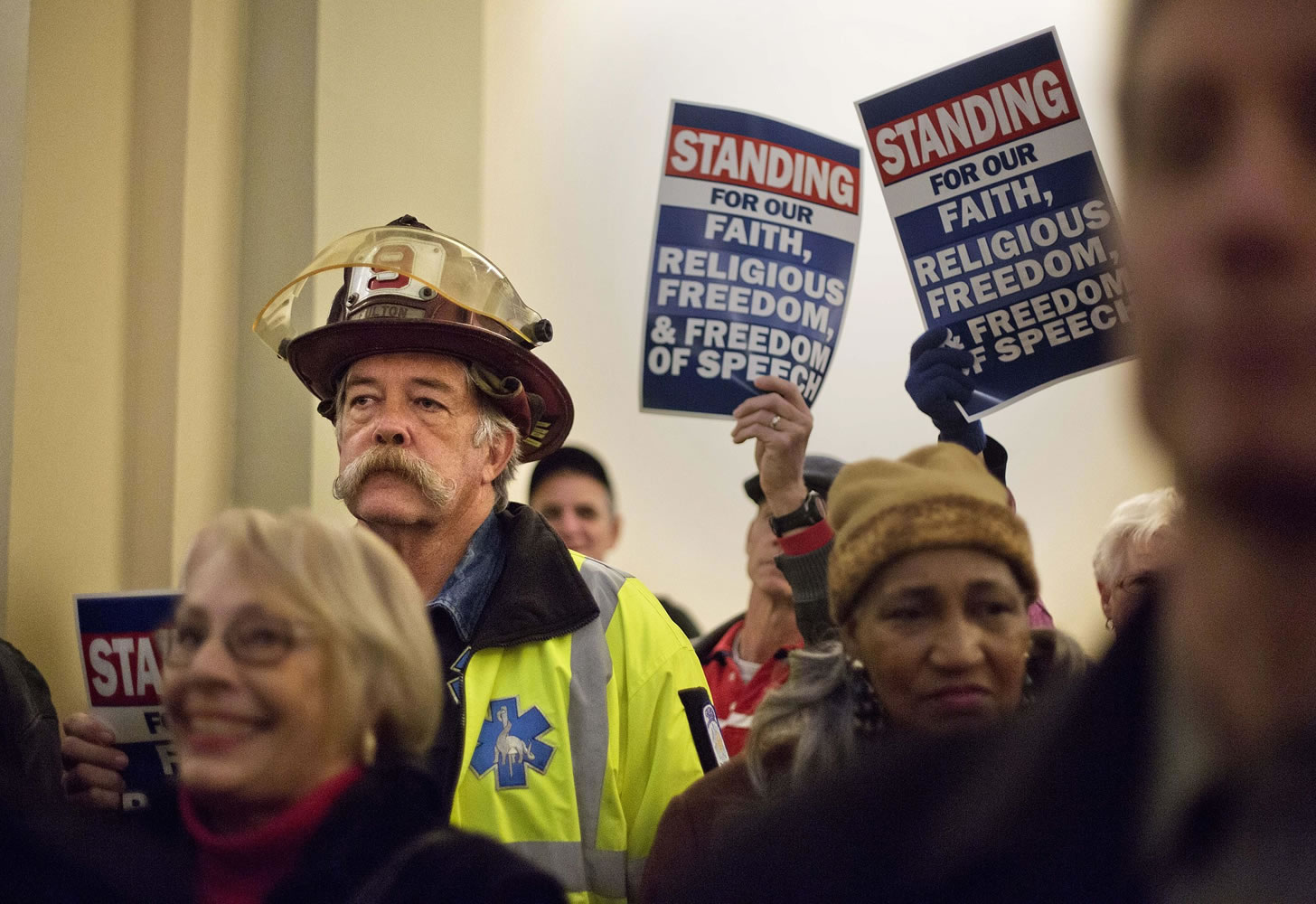ATLANTA — A Texas lawmaker would strip the salaries from government officials who honor same-sex marriage licenses.
Other states would protect government officials who opt out of performing gay nuptials.
In Georgia, where lawmakers are considering a bill that critics fear could allow businesses to discriminate against gay customers, the former head of the country’s largest Protestant denomination recently urged lawmakers to rein in “erotic liberty.”
The U.S. Supreme Court will hear arguments in April and could decide by June whether gay couples can marry, and national opinion polls show U.S. voters increasingly unopposed to gay rights. Yet lawmakers in a handful of states are backing longshot legislation targeting gay rights, doubling down on the culture wars. Most, if not all, of the efforts are led by Republicans.
The bills are more political theatre than serious policy. Few seem to have widespread support among lawmakers, and senior Republicans are not adopting these efforts as their own. In Georgia, well-funded business groups oppose them.
Still, the legislation remains popular with vocal and organized voting blocks in states or parts of the states where they’ve been proposed. But any political points they score could come at a price.
If the bills’ backers manage to force a sharp debate in coming weeks, and the Supreme Court rules in favor of gay marriage a few months later, supporters of the bills would be exposed to criticism that they’ve been fighting for a fringe issue.
“On no issue during my 40-year career have opinions moved as rapidly as they have on the issue of the morality of gay relationships and ultimately gay marriage,” said Whit Ayres, a Republican consultant for Florida Sen. Marco Rubio, Tennessee Gov. Bill Haslam and the National Rifle Association. “When you have conservative organizations like the U.S. military and the Boy Scouts openly accepting gay members, the debate is close to being over.”
Not in Georgia. In a devotional delivered to newly convened lawmakers, the former president of the Southern Baptist Convention urged them to defend the freedom to act on religious beliefs, though he stopped short of endorsing legislation that supporters say would do precisely that.
“We are a living in a society that is on a collision course with a choice between erotic liberty and religious liberty,” the Rev. Bryant Wright told lawmakers. “… Your role in government is about restraining sin.”
Georgia politicians rejected tougher legislation last year, avoiding a showdown that occurred over a similar bill in Arizona, where Gov. Jan Brewer vetoed a measure the Republican-controlled Statehouse had adopted.
This year, the toughest measure comes in Texas, where Republican state Rep. Cecil Bell has proposed stripping state and local officials of their salaries if they issue or honor same-sex marriage licenses. In 2005, Texas voters approved an amendment to the state constitution banning gay marriage, but a federal judge struck it down last year. The judge stayed his ruling until an appeals court could consider the issue.
Republican lawmakers in South Carolina, Virginia and Utah have proposed giving government officials or wedding celebrants the right to opt out of gay nuptials if participating violates their religious beliefs.
In Georgia, the debate flared this month when Atlanta Mayor Kasim Reed fired the city’s fire chief after learning the chief self-published a book describing homosexuality as a perversion. Reed, a Democrat, said the fire chief never got city permission to publish the book, but the fire chief said he did.
The Washington-based Family Research Council and others have used the firing to rally support for the latest legislation in Georgia, though it’s unclear the proposed law would have made a difference. The legislation would forbid the state government from infringing on a person’s religious beliefs unless the government can prove it has a compelling interest.
Unlike legislation in other states, the bill in Georgia makes no reference to same-sex relationships, though critics fear it would allow businesses to discriminate against gay customers. Other states have passed similar acts.
Republican Rep. Sam Teasley, the bill’s sponsor, denied the bill is about gay marriage.
“This is a modest protection for people of faith,” he said.
The Georgia Chamber of Commerce says it will oppose any bill that allows discrimination. Georgia Gov. Nathan Deal, a Republican, voted for a federal version of the legislation in Congress, though it was before gay marriage began in the United States.
“It’s not a bill that I’m going to be pushing on my own initiative, but it is one that I have sentiment for,” Deal said.
The Republican speaker of Georgia’s House of Representatives, Rep. David Ralston, has signaled his skepticism.
“This is obviously something that was important to the drafters of the constitution because they put religious freedom in the constitution,” Ralston told reporters. “I want to know what this bill does that the constitution doesn’t do.”
——
Associated Press reporters David Crary in New York, Will Weissert in Austin, Texas, and Seanna Adcox in Columbia, South Carolina, contributed to this report. Follow Ray Henry on Twitter: http://twitter.com/rhenryAP. Follow Kathleen Foody at http://twitter.com/katiefoody.



